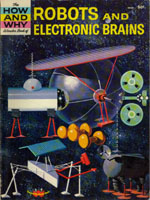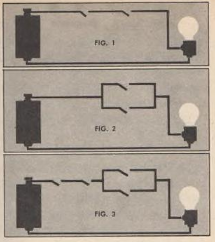Here’s my intro as posted in the 6502.org forums:
About me: Someone gave me a “How Why and Wonder” book of computers at an early age, and someone mentioned electronic brains, and that must have set me off. There was a diagram in that book with a battery and a light bulb and two switches in series, which was supposed to illustrate AND logic. I didn’t get it, but that was a challenge.
Maybe this was the book?

At the age of 13, I got a paper round, and sometime around then I started buying “Practical Electronics.” There was a hugely complex project to build a Mastermind game with 74-series logic, and shortly afterwards a much shorter project to do the same with a micro. I’d done a paper design to make a combination lock with 74-series, which had got out of hand, and it was obvious that microprocessors were the thing.
The AIM-65 was advertised around that time, maybe the KIM. Certainly the MK14 (an SC/MP thing, cheap but not very capable) was.
So when the magazine had a series on the Compukit UK101 (August 79), that had to become my first microcomputer - expensive as it was, and I think I needed a matching grant from my mother (which was unheard of, don’t tell my brothers.)
But wait! In fact earlier than that, me and a couple of friends had put money together to hire a PET. That was mad. It might have cost £65, we had it for 24 hours, stayed up all night, achieved very little. Bear in mind my weekly income was probably no more than £2.
So maybe the 6502 had already loomed large before I’d gone for the UK101.
(The UK101 was a kit, so it was also my first real effort at soldering: I had a grab bag of 74-series which I’d bought for the combination lock, and might have had some vero board, but I don’t think I had any experience. The 101 didn’t work first time, so I just re-visited every IC pin, and it worked second time. I had no test equipment, unless there happened to be a multimeter around the house, so I don’t know what I would have done if it hadn’t.)
Some years later I bought a Beeb - I know they were only for rich kids, but I had a secret. I was a student, and in those days if you spent no money at all on living (i.e. drinking, smoking, other forms of intoxication) you could actually run a surplus.
Some many years after the Beeb, I went for the Amiga, but then we’re straying off topic. By then I’d started work in the chip industry, and for the most part I’ve worked in or near CPU teams, in supporting roles. It can’t be entirely coincidence: I continue to find processors fascinating.
Most recently, I’ve picked up on FPGAs and got involved with the visual6502 project. Having the 6502 circuit and layout to analyse and simulate is great. Being able to make our own chips is also great - updating a chip design in-circuit in a matter of seconds is extraordinary.
Long story short: I end up fixated on computers, on logic, on electronics, on the 6502 in particular. I find small programming puzzles interesting, and large programming projects difficult.

 Reading about old machines really brings back memories and I appreciate all the descriptions of systems I did not get to know. There is real history here.
Reading about old machines really brings back memories and I appreciate all the descriptions of systems I did not get to know. There is real history here.